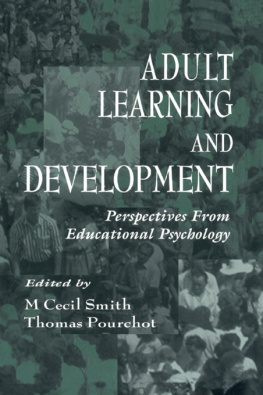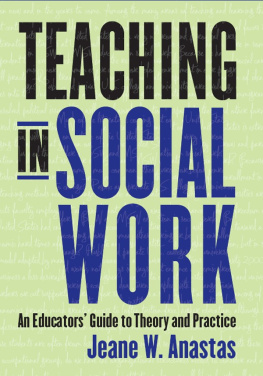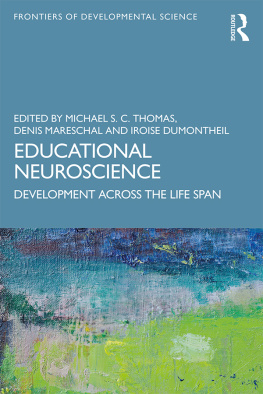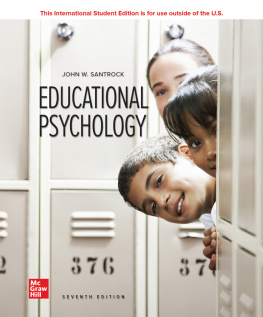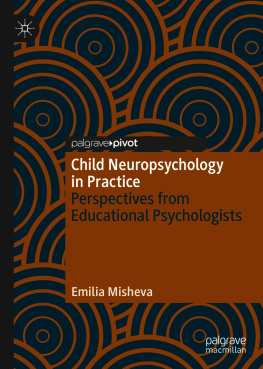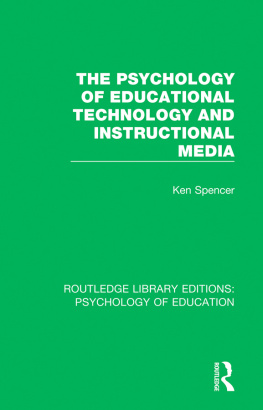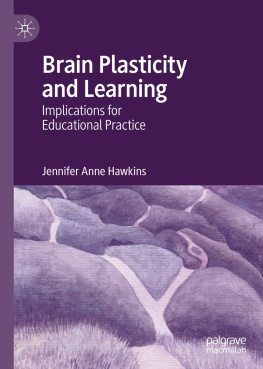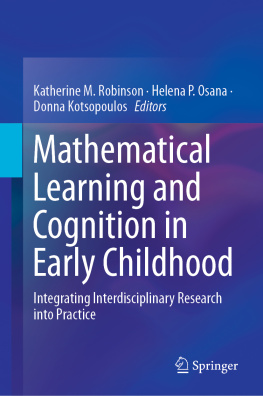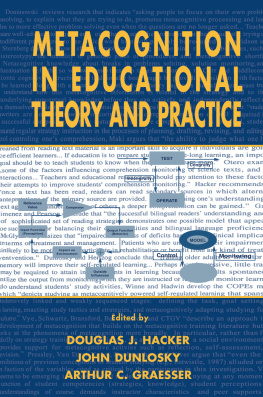
Adult Learning and Development
Perspectives From Educational Psychology

The Educational Psychology Series
Robert J. Sternberg, Series Editor
Marton/BoothLearning and Awareness
Hacker/Dunlosky/GraesserMetacognition in Educational Theory and Practice
Smith/PourchotAdult Learning and Development: Perspectives From Educational Psychology
Adult Learning and Development
Perspectives From Educational Psychology

Edited by
M Cecil Smith
Thomas Pourchot
Northern Illinois University

Copyright 1998 by Lawrence Erlbaum Associates, Inc.
All rights reserved. No part of this book may be reproduced in any form, by photostat, microfilm, retrieval system, or any other means, without the prior written permission of the publisher.
First published by Lawrence Erlbaum Associates, Inc., Publishers
This edition published 2011 by Routledge
711 Third Avenue, New York, NY 10017, USA
2 Park Square, Milton Park, Abingdon, Oxon, OX14 4RN
Routledge is an imprint of the Taylor & Francis Group, an informa business
Cover design by Kathryn Houghtaling Lacey
Library of Congress Cataloging-in-Publication-Data
Adult learning and development : perspectives from educational psychology / edited by M Cecil Smith, Thomas Pourchot
p. cm.
Includes bibliographical references and index.
ISBN 978-0-8058-2523-7(cloth : alk. Paper).
ISBN 978-0-8058-2524-4(pbk. : alk. paper)
1. Adult educationpsychological aspects. 2. Adult learning. 3. Developmental psychology. 4. Educational psychology. I. Smith, M Cecil. II. Pourchot, Thomas.
LC5225.P78A48 1997
374'.001'9dc21
97-30926
CIP
Contents
Foreword
Michael Pressley
What Does Educational Psychology Know About Adult Learning and Development?
M Cecil Smith and Thomas Pourchot
We Learn, Therefore We Develop: Learning Versus Developmentor Developing Learning?
Nira Granott
Abstraction, the Will, the Self, and Modes of Learning in Adulthood
Juan Pascual-Leone and Ronald R. Irwin
Extending Sociocultural Theory to Adult Learning
Curtis Jay Bonk and Kyung A. Kim
On the Development of Adult Metacognition
Gregory Schraw
Changing Mind, Changing World: Practical Intelligence and Tacit Knowledge in Adult Learning
Bruce Torff and Robert J. Sternberg
The Role of Adults Beliefs About Knowledge in School, Work, and Everyday Life
Marlene Schommer
Adult Intelligence: Sketch of a Theory and Applications to Learning and Education
Phillip L. Ackerman
Mnemonic Strategies for Adult Learners
Russell N. Carney and Joel R. Levin
Adult Age Differences in Reading and Remembering Text and Using This Information to Make Decisions in Everyday Life
Bonnie J. F. Meyer and Andrew P. Talbot
The Educational Psychology of Reading in Adulthood
M Cecil Smith
Forgiveness Education With Adult Learners
Catherine T. Coyle and Robert D. Enright
Contributions of Parent Education to Adult Development
Lee Shumow
Toward an Adult Educational Psychology
M Cecil Smith and Thomas Pourchot
Foreword
Michael Pressley
University of Notre Dame
A bridge between educational psychology and the fields of adult learning and development is long overdue. This book provides that bridge.
A few years ago, I attended my first conference on adult learning. The positive aspect of that experience was that I was exposed to a group of researchers and ideas that I had not encountered in traditional educational psychology. The down side of the conference was the realization that none of the participants knew much about the mainstream ideas in educational psychology, including ones that are relevant to adult learning. Many of the ideas that adult learning scholars need to know about educational psychology are covered in this book.
I have long been a reader of the adult development literature. The area has been much influenced by advances in research design, measurement, and data analyses that permit some separation of the effects of development per se from cohort membership and the effects of repeated testing. At a conceptual and theoretical level, however, a reading of any volume of psychology and aging reveals greater commitment to neobehavioral models and models of psychometric intelligence than is true in the larger educational and developmental psychology literatures. These experiences and many related ones have left me with the impression that contemporary educational psychology, especially as it relates to human development, has been sailing a different course than scholars in adult learning and development. As a reader of all of these relevant literatures, however, I see that it can be differentthat connections can be made. The contributors to this book are leading the way in making such connections, for example, between human development as conceived by traditional developmental psychologists and adult development as conceived by specialists in adult learning and development.
In this volume, leading educational psychologists, all of whom are also interested in human development, extend their thinking specifically to address problems in adult development and learning. The book includes contributions about enduring general issues, such as relations during adulthood between learning and development, self-concept and learning, cultural identification and learning, and metacognition and cognition. The volume connects well with the life-span literature in that there are important chapters pertaining to intelligence and learning, ones complementing well the work that predominates in journals such as Psychology and Aging and Journal of Gerontology: Psychological Sciences. There is a real freshness to the contributions in this book, however, with critically informative commentaries on issues relating to practical intelligence, how epistemological beliefs affect performance in school and the workplace, and the complex nature of intelligence as a mixture of process, personality, interest, and knowledge. In contrast to the many articles and chapters I have read lamenting the decline of intellectual skills in adulthood, this volume includes a chapter on mnemonic methods that go far in improving adult memory, as well as two chapters about the adaptations and reading characteristicsincluding strengthsof older compared to younger adults. One of the most important contemporary extensions of neo-Piagetian thinking is also represented here, with work on the development of forgiveness as a problem of cognitive development considered in some detail. Lest we forget that the development of generations interpenetrate, there is also coverage of how parenting and parent education impacts the development of parents.
In concluding the book, Smith and Pourchot systematically review and integrate the contributions in the volume, making a case for the importance of the work reported in each chapter. I conclude this foreword by saying what they could not say: By assembling contributions about learning and development in adulthood, Smith and Pourchot do much to advance the field of educational psychology onto a path that is not yet well worn, but is likely to be worn better because of the heuristic value of the chapters in this book. This volume is an important contribution to the educational psychology literature, as it provides plenty of inspiration and guidance for those who wish to pursue a research trail in educational and developmental research that has been taken less often than the path through childhood and adolescence. For the more casual reader, this volume provides an exciting set of vantage points from which to consider development, making clear that there are many important changes after adolescence. I would be less than candid if I did not say that I found a lot of illumination about the nature of changes in my own life during adulthood in this volume. In short, Smith and Pourchot have assembled a set of chapters that inform us about important scientific work and also inform us about ourselves as adults who are ever learning and ever developing. More than a must read for educational and developmental psychologists, it is an intriguing and engaging read for any mindful adult who wonders what has been happening to her or him, and what is likely to happen in the decades ahead.
Next page
